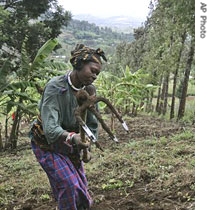VOA慢速英语-Development Report - Could Women Solve the Food Cris
搜索关注在线英语听力室公众号:tingroom,领取免费英语资料大礼包。
(单词翻译)
The U.N. holds a high-level conference on world food security this week in Rome. In Washington, a research group says greater investment in female farmers would increase agricultural productivity. Transcript1 of radio broadcast:
01 June 2008
This is the VOA Special English Development Report.
On Tuesday, the United Nations will open a "food summit" in Rome. Leaders and high-level officials from around the world will meet at the Food and Agriculture Organization headquarters. The F.A.O. says they will discuss the effects of rising food prices, limited resources, climate change, increased energy needs and population growth.
The United Nations agency says the three-day summit offers a historic chance to re-launch the fight against hunger and poverty. Another goal is to increase agricultural production in developing countries.
Poor countries will likely spend up to one hundred seventy billion dollars this year to import food -- up forty percent from last year.
A new report says agricultural prices should ease from their recent record highs. International prices for most crops have started to drop, mainly because of increased production.
But over the next ten years, food prices are expected to average well above levels of the past ten years. World grain supplies are low and need to be refilled, and food crops are being used to make biofuels.
The report came from the Organization for Economic Cooperation and Development and the F.A.O.
The F.A.O. has suggested several measures to deal immediately with the situation. These include supplying food to at–risk populations and seeds, fertilizer and animal feed to local farmers.
 |
| A woman works in a field at a farm near the Tanzanian town of Arusha |
But what about long-term answers to food security? The International Center for Research on Women says one answer is investing more in female farmers.
Rekha Mehra is the director for economic and development issues at the Washington-based nonprofit. She says improving women's ability to get resources and technology can directly increase agricultural productivity.
After all, women produce as much as eighty percent of the food in developing countries. In parts of Africa, for example, men are responsible for cash crops while women are generally responsible for food crops. And, around the world, women are the ones mainly responsible for their families’ nutrition.
Women farmers usually have to own land to receive loans and other resources. Yet, in many developing countries, women do not have property rights like men have.
Rekha Mehra says the right to own land will lead to greater investment in the land. She says world leaders need to think about these gender2 issues when they meet in Rome this week.
And that’s the VOA Special English Development Report, written by Jill Moss3.




